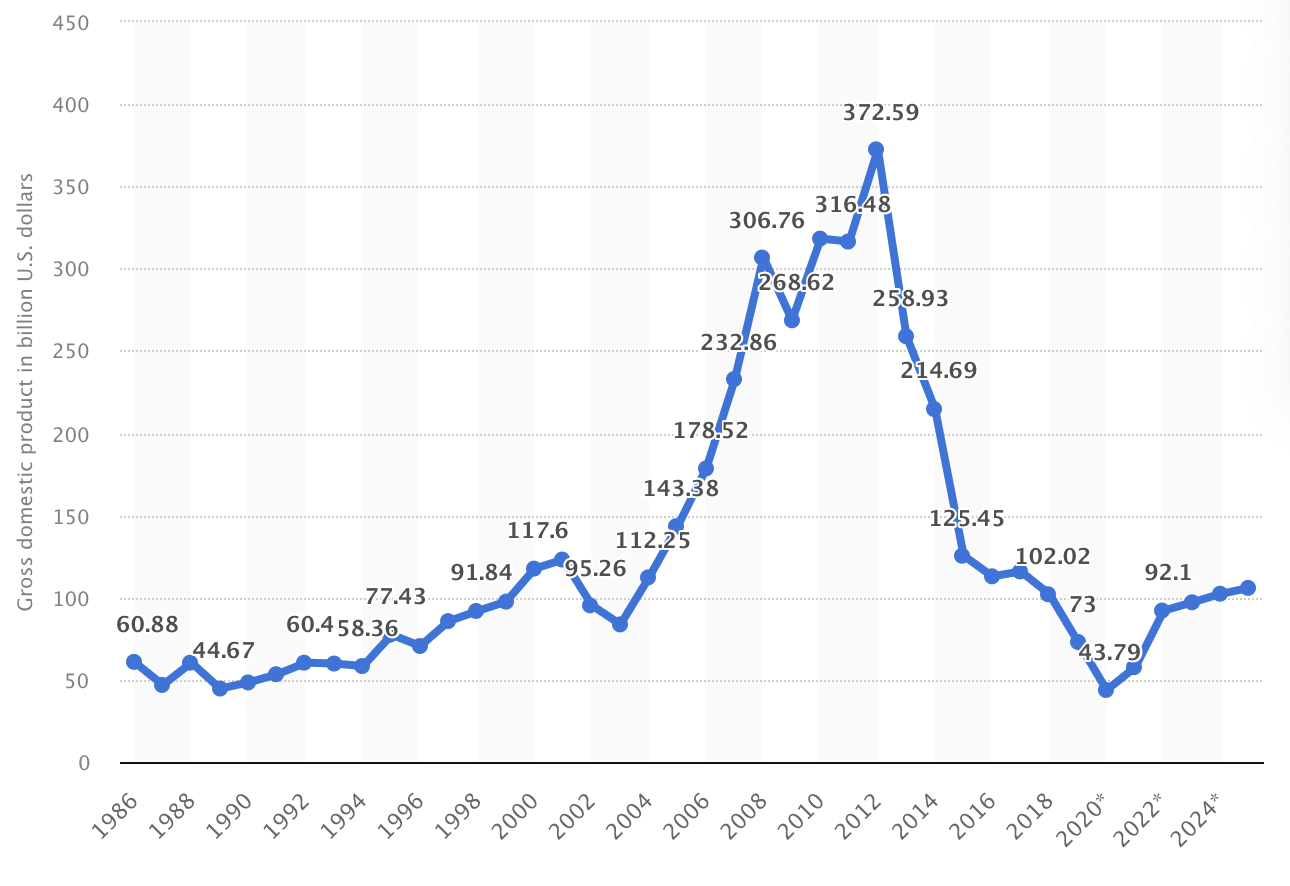The Big Difference Between The U.S. And Venezuela Is Economic Policy Francis Menton
Here in the U.S., we are accustomed to economic growth almost every year. Look at a chart of U.S. GDP over the course of the last century, and the impression is of near-continuous and extremely robust growth. Here is such a chart from USA Facts, based on data from the Bureau of Economic Analysis (Commerce Department).
The so-called “Great Recession” of 2008-09 registers as barely a blip. Same for the Covid-related dip of 2020. (Note in the graph that backing out inflation flattens the slope of the curves to some degree, but does not change the basic form of robust and continuous growth.)
This pattern of continual growth is unfortunately not true for all countries. For an extreme case of the opposite situation, consider Venezuela. Venezuela elected the socialist Hugo Chavez in 1998, and he and his ideologically-aligned successor Nicolas Maduro have ruled ever since. It is not easy to get useful economic data from Venezuela. The best I can find for its GDP since the Chavez election and to the present is from Statista. Here is their chart:

I would not necessarily take these data from Statista as gospel. The main source is necessarily the Venezuelan government, which is highly suspect. The large run-up from 2004 to 2013 is probably mostly not real, being created by a combination of blow-out government spending (counted as real in GDP by economists) and increasing oil prices. On the other hand, the post-2013 collapse is undoubtedly very real. In fact, the collapse is likely understated, because the Venezuelan government would clearly cook the books in any way it could. Even if you think the current figure is mostly accurate, it leaves Venezuelan GDP today at well less than it was in the year 2000, and barely more than a quarter of what it was in 2013.
So what has brought about such an economic collapse for Venezuela? Apologists for the regime often cite the rapid fall of oil prices that occurred in 2014 and thereafter. But then, Texas also has an economy highly focused on the oil industry, and yet its economy has boomed in the decade since 2014. The same goes for many other oil and gas producing states and countries.
The clear thing that distinguishes Venezuela from economically successful places, and from the U.S. in particular, is that Venezuela has adopted one after another of economically destructive policies, well summarized by the word “socialism.” Let’s list a few: extensive price controls, particularly on food; huge increases in government spending notably on housing subsidies and redistributions; destroying the independence of the Supreme Court and of election authorities; “free” public healthcare.
Now we suddenly have a presidential nominee of the Democratic Party who has gone some combination of silent and vague on what economic policies she would implement if elected. Isn’t the presidency just about “vibes” and “joy”?
However, what little Ms. Harris has had to say so far on economic policy bears a remarkable resemblance to the Venezuelan program, notably price controls and middle class entitlements. Since she has gone silent, we have little to go on. But Kimberley Strassel in today’s Wall Street Journal points out that Senate Majority Leader Schumer let some of the mask down in an interview with CNN on Monday:
[Schumer] declared he was “committed” to everything Ms. Harris has outlined so far—the child tax-credit blowout, the new housing entitlement and all the rest. The moderator at one point noted cost estimates were $2 trillion; Mr. Schumer didn’t bat an eye. Reminded that even liberals were panning her price-control proposals, Mr. Schumer brushed them aside. This is “a good thing to do,” he assured, and he later promised price controls on drugs, too.
How about destroying the independence of election authorities and the Supreme Court?:
One of his first priorities would be the federal voting takeover that Democrats have been laboring to impose since 2021. Also important, said Mr. Schumer, is changing the Supreme Court; everything is on the table—including term limits. And “we’ve got to do more on climate change.”
Even Venezuela isn’t crazy enough to be trying to solve “climate change.”
The entire difference between economic success and failure for a country is good economic policy. I certainly hope that the voters will be smart enough to look through the current program of obfuscation by the Democrats to see what they actually have planned for us.
Comments are closed.
